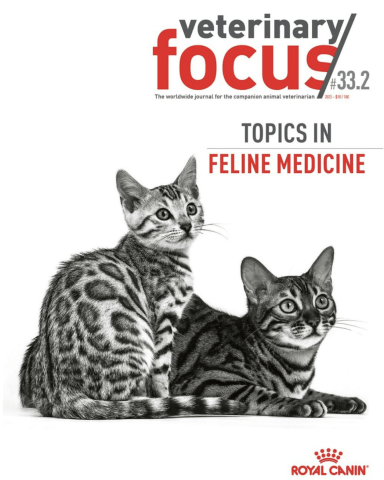
Get access to all handy features included in the IVIS website
- Get unlimited access to books, proceedings and journals.
- Get access to a global catalogue of meetings, on-site and online courses, webinars and educational videos.
- Bookmark your favorite articles in My Library for future reading.
- Save future meetings and courses in My Calendar and My e-Learning.
- Ask authors questions and read what others have to say.
A friendly approach to the senior cat consult
Get access to all handy features included in the IVIS website
- Get unlimited access to books, proceedings and journals.
- Get access to a global catalogue of meetings, on-site and online courses, webinars and educational videos.
- Bookmark your favorite articles in My Library for future reading.
- Save future meetings and courses in My Calendar and My e-Learning.
- Ask authors questions and read what others have to say.
Read
Cats are living longer and better lives; how can we ensure that the healthcare we offer them is optimal? This article offers some hints.
Sarah M. A. Caney
BVSc, PhD, Dip. SAM(Feline), MRCVS, Nantwich Pet Vets, Cheshire, UK
Sarah Caney is a University of Bristol graduate who has been a feline-only clinician for more than twenty years, and is a recognized RCVS Specialist in Feline Medicine. She has worked in a range of clinics including university hospitals and private practices of varying size, and currently leads the feline service at a large UK veterinary hospital. Dr. Caney is also the founder of Vet Professionals, a company that conducts research (often including online owner and veterinarian surveys) and offers education, publishing and consultancy services. Her website (www.vetprofessionals.com) has a wealth of free-to-access resources for cat owners and clinicians.

Keypoints
-
Maintaining regular contact with older cats is essential to support health; simple checks such as thorough history taking, and weight monitoring can help detect issues that need attention.
-
Subclinical disease is common in older cats, whilst multiple co-morbidities are often present, which can complicate diagnosis and treatment of illnesses.
-
Preventative healthcare aims to identify illness at the earliest possible point, such that appropriate interventions can be applied.
-
Providing good senior care is extremely rewarding to clinicians and very much appreciated by carers.
Introduction
The term “Senior” is generally applied to cats aged 11 years and over, although it is acknowledged that it may be appropriate to use this term for some cats that are younger than this 1. Over the past few decades, it has become more and more routine for cats to survive far beyond the threshold for the “Senior” life stage, with many now living into their twenties; a recent report documented a 27-year-old cat living in London as the world’s oldest cat 2. Whilst cats aged 15 years and over were formerly referred to as “Geriatric”, following negative feedback from carers, the UK-based charity International Cat Care (ICC) now categorizes these cats as “Super Senior” – a term which has been very well received. ICC also produced a chart estimating the human equivalent age for cats, which is helpful when discussing health and preventative healthcare needs of older animals (Table 1). Age-related health interventions, such as testing of feces for occult blood as a screen for bowel cancer, have been employed for many years in human medicine, and recent Covid vaccination strategies around the world have introduced younger people to this concept. Comparing the age of the feline patient to a human equivalent is helpful in reinforcing recommendations for “life-stage appropriate” preventative healthcare measures.
[...]
Get access to all handy features included in the IVIS website
- Get unlimited access to books, proceedings and journals.
- Get access to a global catalogue of meetings, on-site and online courses, webinars and educational videos.
- Bookmark your favorite articles in My Library for future reading.
- Save future meetings and courses in My Calendar and My e-Learning.
- Ask authors questions and read what others have to say.
About
How to reference this publication (Harvard system)?
Author(s)
Copyright Statement
© All text and images in this publication are copyright protected and cannot be reproduced or copied in any way.Related Content
Readers also viewed these publications
Subscribe
Access to the content of the Veterinary Focus website is reserved for animal health professionals. If you do not yet have a user account with Royal Canin you can create a free account by selecting the New User form. Subscription to the journal is free and issues in your preferred language can be obtained at the Veterinary Focus website.




Comments (0)
Ask the author
0 comments